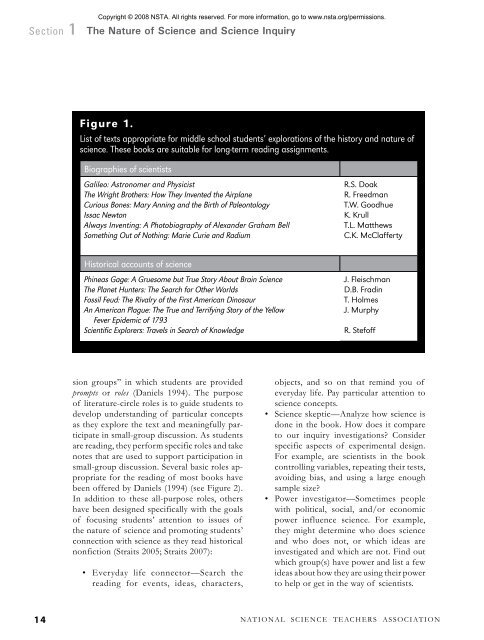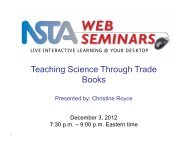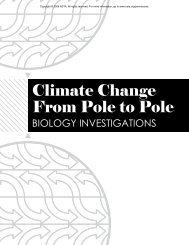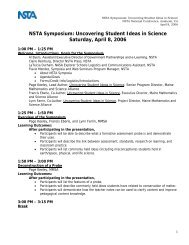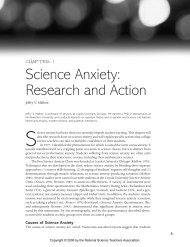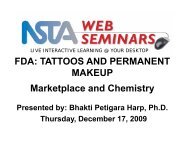Copyright © 2008 NSTA. All rights reserved. For more information ...
Copyright © 2008 NSTA. All rights reserved. For more information ...
Copyright © 2008 NSTA. All rights reserved. For more information ...
Create successful ePaper yourself
Turn your PDF publications into a flip-book with our unique Google optimized e-Paper software.
14<br />
<strong>Copyright</strong> <strong>©</strong> <strong>2008</strong> <strong>NSTA</strong>. <strong>All</strong> <strong>rights</strong> <strong>reserved</strong>. <strong>For</strong> <strong>more</strong> <strong>information</strong>, go to www.nsta.org/permissions.<br />
Section 1 The Nature of Science and Science Inquiry<br />
Figure 1.<br />
List of texts appropriate for middle school students’ explorations of the history and nature of<br />
science. These books are suitable for long-term reading assignments.<br />
Biographies of scientists<br />
Galileo: Astronomer and Physicist<br />
The Wright Brothers: How They Invented the Airplane<br />
Curious Bones: Mary Anning and the Birth of Paleontology<br />
Issac Newton<br />
Always Inventing: A Photobiography of Alexander Graham Bell<br />
Something Out of Nothing: Marie Curie and Radium<br />
Historical accounts of science<br />
Phineas Gage: A Gruesome but True Story About Brain Science<br />
The Planet Hunters: The Search for Other Worlds<br />
Fossil Feud: The Rivalry of the First American Dinosaur<br />
An American Plague: The True and Terrifying Story of the Yellow<br />
Fever Epidemic of 1793<br />
Scientific Explorers: Travels in Search of Knowledge<br />
sion groups” in which students are provided<br />
prompts or roles (Daniels 1994). The purpose<br />
of literature-circle roles is to guide students to<br />
develop understanding of particular concepts<br />
as they explore the text and meaningfully participate<br />
in small-group discussion. As students<br />
are reading, they perform specific roles and take<br />
notes that are used to support participation in<br />
small-group discussion. Several basic roles appropriate<br />
for the reading of most books have<br />
been offered by Daniels (1994) (see Figure 2).<br />
In addition to these all-purpose roles, others<br />
have been designed specifically with the goals<br />
of focusing students’ attention to issues of<br />
the nature of science and promoting students’<br />
connection with science as they read historical<br />
nonfiction (Straits 2005; Straits 2007):<br />
• Everyday life connector—Search the<br />
reading for events, ideas, characters,<br />
R.S. Doak<br />
R. Freedman<br />
T.W. Goodhue<br />
K. Krull<br />
T.L. Matthews<br />
C.K. McClafferty<br />
J. Fleischman<br />
D.B. Fradin<br />
T. Holmes<br />
J. Murphy<br />
R. Stefoff<br />
objects, and so on that remind you of<br />
everyday life. Pay particular attention to<br />
science concepts.<br />
• Science skeptic—Analyze how science is<br />
done in the book. how does it compare<br />
to our inquiry investigations? consider<br />
specific aspects of experimental design.<br />
<strong>For</strong> example, are scientists in the book<br />
controlling variables, repeating their tests,<br />
avoiding bias, and using a large enough<br />
sample size?<br />
• Power investigator—Sometimes people<br />
with political, social, and/or economic<br />
power influence science. <strong>For</strong> example,<br />
they might determine who does science<br />
and who does not, or which ideas are<br />
investigated and which are not. Find out<br />
which group(s) have power and list a few<br />
ideas about how they are using their power<br />
to help or get in the way of scientists.<br />
NATIoNAL ScIeNce TeAcheRS ASSocIATIoN


